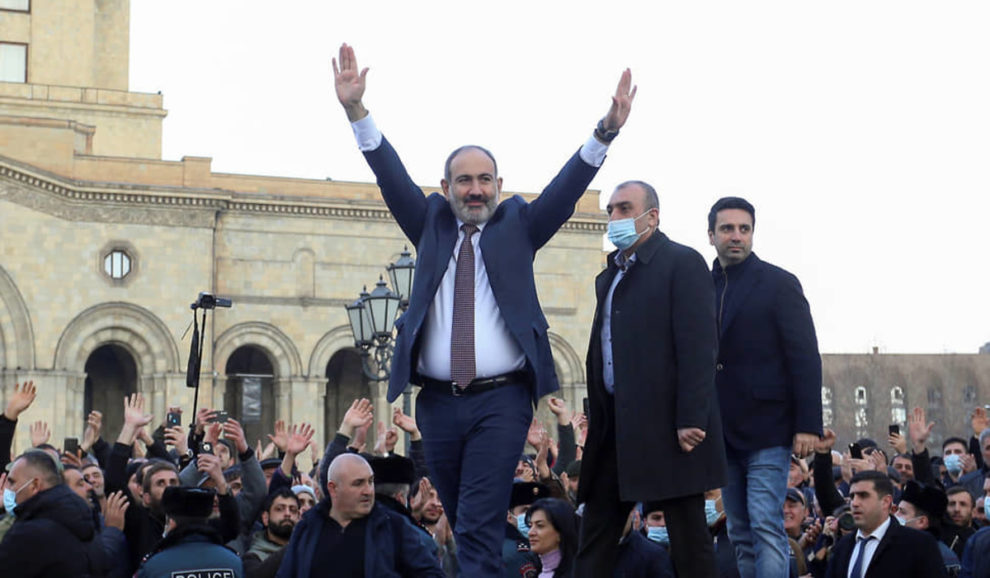Armenia’s PM Pashinyan accuses the military of organizing a coup against him after a demand for his resignation.
New tensions are emerging in Armenia and creating political instability in the country. Prime Minister Nikol Pashinyan denounced an attempted military coup in Armenia after the General Staff demanded his resignation. For Pashinyan, the demand of the military was carried out in an aggressive and threatening tone, breaking with legality, and can be qualified as an attempted coup. Pashinyan asked all of his supporters to take to the streets in protest against the actions of the military and promised to hold large public speeches and online transmissions explaining the case with more information.
Armenia government’s reaction to the military coup has already begun. Pashinyan immediately dismissed Armenian Armed Forces Chief of Staff, Colonel-General Onik Gasparian, on charges of attempted coup due to the demand for resignation. Before going public to denounce the military action, Pashinyan had also dismissed the first deputy chief of staff, Tigran Jachatrian, on the same charges. Other measures are expected but have not been stated yet. Immediately after news of an attempted coup, rumors began to appear that Pashinyan and his family were planning to flee to Germany, leaving the government, but the prime minister vehemently denied such accusations.
In a demonstration with his supporters in Yerevan, Pashinyan described his country’s current situation as “tense, but under control”. The prime minister at no time used a rhetoric of rivalry with the military, refusing to classify them as “internal enemies”. On the contrary, he said that the attempted coup was due to several problems that can be solved without major damage and said that the demand for his resignation was an “emotional” attitude. Still, the Prime Minister reinforced his orders for the military to remain active in protecting the borders and in serving the State and the people and to abdicate from trying to participate in political processes that do not belong to them. Pashinyan clearly tries to transmit signals of tranquility and control in the face of an obscure situation, where the intentions of both sides involved in the controversy are not absolutely unknown.
Opposition to the prime minister, however, is not restricted to the military. There is a strong campaign against the head of government, which is operated both inside Parliament and on the streets. Pashinyan proposed to the opposition that parliamentary elections be anticipated, which was not accepted because his opponents demand an immediate resignation, which he does not accept. Pashinyan said the only way he can leave voluntarily is through popular will. It is difficult to calculate “popular will”, but, in fact, there are protests against the Prime Minister – as well as protests in favor. According to his opponents, the popular desire is for him to leave. In this sense, the opposition party Prosperous Armenia made a statement asking Pashinyan to “avoid a civil war”, leaving peacefully and without hostilities.
In addition, there was an official stance by the former president of Armenia, Robert Kocharian in favor of the resignation of the prime minister, which is noteworthy, considering the significance that the position of a former president represents for public opinion. For Kocharian, the military, in demanding the resignation of the prime minister, are not conspiring against the government, but demanding that the popular wish be realized. On his social media channel, Kocharian started a strong popular campaign in favor of the armed forces. One of the main arguments of Kocharian’s speech – as well as that of other opposition leaders – is that the authorities lost the war against Azerbaijan without using all necessary efforts, having surrendered Armenian territory “passively” to a foreign government, which would be inadmissible and supposedly evidence that Pashinyan acts in collusion with external agents and against Armenian interests.
In the international arena, reactions to the Armenian scenario have already begun to emerge. In Moscow, Russian president spokesman Dmitri Peskov expressed a call for calm and peace, saying that any tensions should be discussed and resolved within the framework of constitutional legality. In his speech, Peskov emphasized the historical ties between both countries and the importance of Armenia for the entire Eurasian region. In the same vein, Sergey Lavrov spoke by phone with the Armenian foreign minister, Ara Aivazián, and both guaranteed mutual efforts for the situation to be resolved peacefully.
The same concerns were expressed by Washington, which stated to be concerned about tensions and called for moderation on both sides. Turkey, on the other hand, emphasized support for the government and condemned the military, endorsing the coup narrative. When commenting the case, the Turkish Foreign Minister Mevlut Cavusoglu stated: “We strongly condemn the coup attempt in Armenia”.
Considering these facts, we have an absolutely open and obscure scenario, where anything can happen in the next few days. Pashinyan calls the people in his favor to organize demonstrations and claims to get popular support, but it is undeniable that thousands of people are taking to the streets in protest against his government. There is no room for judgment on possible collusion with external forces, but it is true that the Armenian government made strategic mistakes that allowed its defeat against Azerbaijan and it is reasonable for the military to be unsatisfied with this. It is too early for any position to be taken on the case, but, considering the Armenian historical tensions and the absence of a dialogue between the sides, the crisis is highly likely to increase and generate an internal conflict in the country.
Lucas Leiroz, research fellow in international law at the Federal University of Rio de Janeiro.
